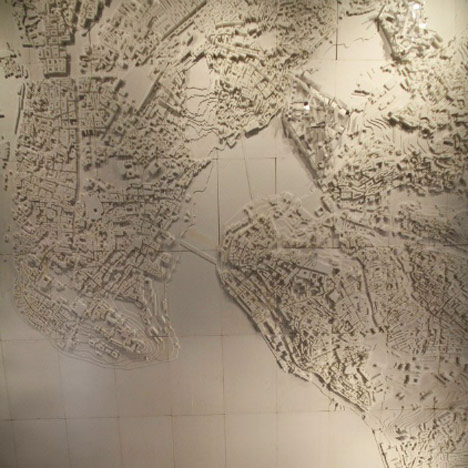Istanbul Design Biennial: Turkey's frenetic, unplanned growth means it needs good design more than most other countries, according to the organiser of the inaugural Istanbul Design Biennial, which opened this week.
Top image: model of Istanbul on the ceiling of the Adhocracy exhibition at the biennial
"We need cities that are better designed, we need products that are better designed," said Bülent Eczacıbaşı (pictured below), chairman of the Istanbul Foundation for Culture and Arts (IKSV), which organised and sponsored the biennial. "We all know that a design culture is very important but also our need for good design is more important than other countries."
Eczacıbaşı, speaking at a press lunch in Istanbul, added: "In industry we need to spread the understanding that products from Turkey need to be better designed. If one day we can make Designed in Turkey a desirable attribute our mission will have been accomplished."
The Turkish economy expanded by 8.5% last year, making it the world's second-fastest growing economy after China, yet there is concern in Turkey about the chaotic nature of development.
"We have to stop and think a bit," said Emre Arolat (pictured below), an architect and the curator of Musibet, one of the two main exhibitions at the biennial. "Things are changing very fast and at this speed it's not possible to manage change well."
Musibet, which means "plague" or "sickness" in Arabic, features 32 projects that respond to the phenomenal growth of Istanbul, which has a population approaching 17 million and which covers more than 5,000 square kilometres.
"This exhibition is not putting a solution on the table but it is asking lots of questions that are not being asked," Arolat told Dezeen. "People are really excited about the transformation. The public here is very positive; they accept everything the government says. We don't have any economic crisis; construction is the main thing in the economy at the moment. The mainstream press is not asking any questions about this because they're really happy about the situation."
Arolat cited plans to build two new cities outside Istanbul, which would destroy the ancient forests that act as the city's "lungs", yet which have received little critical analysis in Turkey.
Above image: Istanbul Modern, venue for the Musibet exhibition
Musibet, along with the Adhocracy exhibition covered in our earlier story, responds to the biennial's central theme of "imperfection". The theme was proposed by Deyan Sudjic, director of the Design Museum in London and a member of the biennial's advisory board.
"There is nowhere better to explore [imperfection] than in Istanbul, a city of infinite layers, charged with the vitality that comes from engaging with rapid urban, social and cultural change" Sudjic writes in the biennial catalogue. "Istanbul as a city, is far from perfect, yet it is one of the most exhilarating and dynamic centres in the world. Its special quality is that it makes so much from the imperfect, the inexact and the provisional."
See all our stories about the Istanbul Design Biennial »
See all our stories about Turkey »

